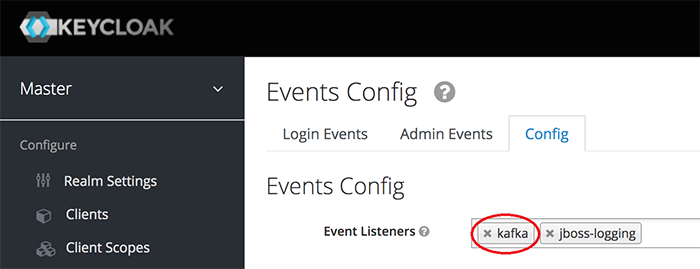Simple module for Keycloak to produce keycloak events to Kafka.
Tested with
Kafka version: 2.12-2.1.x, 2.12-2.4.x, 2.12-2.5.x, 2.13-2.8
Keycloak version: 4.8.3, 6.0.x, 7.0.0, 9.0.x, 10.0.x, 13.0.x, 14.0.x 15.0.x
Java version: 11, 13
You can simply use Maven to build the jar file. Thanks to the assembly plugin the build process will create a fat jar that includes all dependencies and makes the deployment quite easy. Just use the following command to build the jar file.
mvn clean packageFirst you need to build or download the keycloak-kafka module.
To install the module to your keycloak server you have to configure the module and deploy it.
If you deploy the module without configuration, your keycloak server will fail to start throwing a NullPointerException.
If you want to install the module manually as described in the initial version you can follow this guide.
The following properties can be set via environment variables (e.g. ${env.KAFKA_TOPIC}) or as static values.
topicEvents (env KAFKA_TOPIC): The name of the kafka topic to where the events will be produced to.
clientId (env KAFKA_CLIENT_ID): The client.id used to identify the client in kafka.
bootstrapServer (env KAFKA_BOOTSTRAP_SERVERS): A comma separated list of available brokers.
events (env KAFKA_EVENTS): The events that will be send to kafka.
topicAdminEvents (env KAFKA_ADMIN_TOPIC): (Optional) The name of the kafka topic to where the admin events will be produced to. No events will be produced when this property isn't set.
A list of available events can be found here
Download the CLI script from this repository and edit the properties to fit your environment. Also make sure to use the right
server config (line 1). As default the script will configure the module in the standalone.xml. (Be aware that the docker image uses the standalone-ha.xml by default)
Run the CLI script using the following command and check the output on the console. You should see some server logs and lines of {"outcome" => "success"}.
$KEYCLOAK_HOME/bin/jboss-cli.sh --file=/path/to/add-kafka-config.cliIf you want to remove the configuration of the keycloak-kafka module from your server you can run this.
It's also possible to configure the kafka client by adding parameters to the cli script. This makes it possible to connect this module to a kafka broker that requires SSL/TLS connections. For example to change the timeout of how long the producer will block the thread to 10 seconds you just have to add the following line to the cli script.
/subsystem=keycloak-server/spi=eventsListener/provider=kafka:map-put(name=properties,key=max.block.ms,value=10000)
Note the difference of kafka:map-put for kafka client parameters compared to kafka:write-attribute for module parameters.
A full list of available configurations can be found in the official kafka docs.
As mentioned above the kafka client can be configured through the cli script. To make the kafka open a SSL/TLS secured connection you can add the following lines to the script:
/subsystem=keycloak-server/spi=eventsListener/provider=kafka:map-put(name=properties,key=security.protocol,value=SSL)
/subsystem=keycloak-server/spi=eventsListener/provider=kafka:map-put(name=properties,key=ssl.truststore.location,value=kafka.client.truststore.jks)
/subsystem=keycloak-server/spi=eventsListener/provider=kafka:map-put(name=properties,key=ssl.truststore.password,value=test1234)
Copy the keycloak-kafka-<version>-jar-with-dependencies.jar into the $KEYCLOAK_HOME/standalone/deployments folder. Keycloak will automatically
install the module with all it's dependencies on start up. To verify that the deployment of the module was successful you can check if a new file
with the name keycloak-kafka-<version>-jar-with-dependencies.jar.deployed was created in the same folder.
- Open administration console
- Choose realm
- Go to Events
- Open
Configtab and addkafkato Event Listeners.
The simplest way to enable the kafka module in a docker container is to create a custom docker image from the keycloak base image.
The keycloak-kafka-<version>-jar-with-dependencies.jar must be added to the /standalone/deployments folder and the CLI script must be added to the /opt/jboss/startup-scripts/ folder
as explained in Installation. The only difference is that the CLI script will be executed automatically on start up and doesn't have to be executed manually.
An example can be found in this Dockerfile.
The following snippet shows a minimal Spring Boot Kafka client to consume keycloak events. Additional properties can be added to the KeycloakEvent class.
@SpringBootApplication
@Log4j2
public class KafkaConsumerApplication {
public static void main(String[] args) {
SpringApplication.run(KafkaConsumerApplication.class, args);
}
@KafkaListener(topics = "keycloak-events", groupId = "event-consumer")
public void handleKeycloakEvent(KeycloakEvent event) {
log.info("Consumed event: " + event);
}
@KafkaListener(topics = "keycloak-admin-events", groupId = "event-consumer")
public void handleKeycloakAdminEvent(KeycloakAdminEvent event) {
log.info("Consumed admin event: " + event);
}
@Bean
public StringJsonMessageConverter jsonConverter() {
return new StringJsonMessageConverter();
}
}
@Data
class KeycloakEvent {
private String userId;
private String type;
}
@Data
class KeycloakAdminEvent {
private String realmId;
private String operationType;
}Any kind of contributions are welcome.
